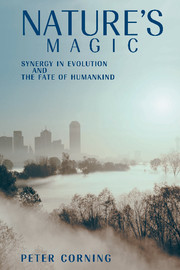Book contents
- Frontmatter
- Contents
- 1 Prologue: The New Evolutionary Paradigm
- 2 The “Enchanted Loom”
- 3 The Magic Castle
- 4 “Black Magic”
- 5 The Synergism Hypothesis
- 6 “The Sorcerer's Apprentice”
- 7 Conjuring Human Evolution: The Synergistic Ape
- 8 Conjuring History: Does Cultural Evolution Have an “Arrow”?
- 9 The Science of History
- 10 Conjuring the Future: What Can We Predict?
- Afterword
- Notes
- References
- Index
6 - “The Sorcerer's Apprentice”
Published online by Cambridge University Press: 22 August 2009
- Frontmatter
- Contents
- 1 Prologue: The New Evolutionary Paradigm
- 2 The “Enchanted Loom”
- 3 The Magic Castle
- 4 “Black Magic”
- 5 The Synergism Hypothesis
- 6 “The Sorcerer's Apprentice”
- 7 Conjuring Human Evolution: The Synergistic Ape
- 8 Conjuring History: Does Cultural Evolution Have an “Arrow”?
- 9 The Science of History
- 10 Conjuring the Future: What Can We Predict?
- Afterword
- Notes
- References
- Index
Summary
It is not the organs … of an animal's body that have given rise to its special habits and faculties; but it is, on the contrary, its habits, mode of life and environment that have in the course of time controlled the shape of its body, the number and state of its organs and, lastly, the faculties which it possesses.
Jean Baptiste de Lamarck Zoological PhilosophyPaul Dukas was a late nineteenth- and early twentieth-century French music critic and composer whose small body of orchestral works might be forgotten today were it not for Walt Disney and the renowned conductor Leopold Stokowski. When Disney teamed up with Stokowski in the late 1930s to produce the then path-breaking cartoon movie Fantasia – a melding of classical music and sometimes surreal visual imagery – one of the pieces they chose for the film was Dukas's “The Sorcerer's Apprentice.” Thanks to Mickey Mouse, this lively scherzo, and the tale that it accompanied, became the centerpiece of the movie.
Based on a narrative poem by the German literary giant Johann Wolfgang von Goethe, the story concerns a great and powerful sorcerer who leaves home for the day and instructs his apprentice (Mickey) to keep watch over things in his absence. The hard-working apprentice is frustrated, however, by the drudge work he is expected to do (like cleaning the house), and he soon hits on the idea of using some of the sorcerer's magic to conjure a helper.
- Type
- Chapter
- Information
- Nature's MagicSynergy in Evolution and the Fate of Humankind, pp. 153 - 187Publisher: Cambridge University PressPrint publication year: 2003



